Exclusive Rafa Nadal interview: emotional farewell and who his biggest rival really was
In an exclusive conversation with AS, Rafa Nadal gives his first Spanish media interview since announcing his retirement. Speaking from Riyadh after playing in the Six Kings Slam, Nadal reflects on his career.
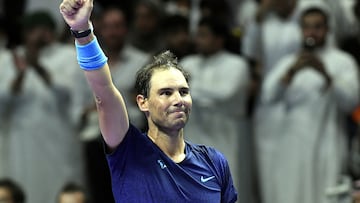
The day after playing his last match against Novak Djokovic in the Six Kings Slam third place match, Rafa Nadal steps out of the hotel elevator in Riyadh, his son in his arms. He greets us warmly before settling into the backseat of a car heading to a family commitment in the Saudi city. His father, Sebastián, rides shotgun, patiently waiting as Nadal talks to AS. The Spaniard looks back on his career, celebrates his successes, and admits his mistakes. It’s not time to discuss the future just yet, because he’s still a tennis player – though his retirement is only a little over a month away.
Q: In the video where you announced your retirement, you looked very emotional. What was the recording process like, and how did you feel?
A: In the end, even if you’ve come to terms with it, the day you announce it, the day you record the video... It’s been so many years and such an important part of my life, all of it really. So, it’s only natural. It’s a change, and let’s be honest, tennis has brought me joy, happiness, and some incredibly intense moments. And when it’s over, it’s over – there’s no going back. It’s only logical that when you make the announcement, no matter how prepared you are, you realize that this is the end. I recorded it a week before it was released, and it had to be done.
If you could go back in time, like in a sci-fi movie, what would you tell your 17-year-old self?
If I could go back, I’d change some things, no doubt. But in the end, I think I mostly did what I had to do—living each moment with enthusiasm, passion, intensity, always trying to improve and do the right thing. To me, that’s the most important thing. I’d tell the younger me to keep working on improving every day. Overall, I think I’ve done that. Of course, not everything has been perfect—not at all—but generally speaking, where I am today brings me great satisfaction. I’m leaving knowing I gave it everything. I feel at peace knowing I did everything I could, and even a little bit more. Because with the injuries, I never gave in; I was determined to come back, to continue, and to do it with a positive mindset. I think I succeeded. There were plenty of moments where it would’ve been easy—and maybe even logical—to let go a bit and say, “That’s it.” But I have the personal satisfaction of always having a team that supported me, a family that stood by me when I needed them most. And I always kept that determination and excitement for what might come next.
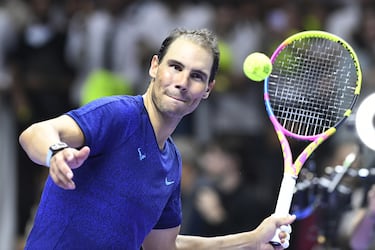
You often describe your career as “incredible,” and honestly, it is. Do you see it that way?
Yeah, I do. It’s incredible that a kid from a small town like Manacor [on the island of Mallorca] has managed to have a long career, and obviously a good one. I started just like any other kid, lucky to have my uncle (Toni) and a family who could support me. From there, a lot of things came together that allowed me to chase my dreams. Sure, many things worked out for me, but there were also plenty of obstacles. Somehow, I always found a way to move forward with a real chance of success.
People say that if you hadn’t been injured so often, you would have won even more Grand Slams. Do you believe that?
Maybe, but... In the end, it’s obvious I missed more Grand Slam opportunities than my rivals, but that’s just how it went. I’m not one to think, “What if I hadn’t had those injuries?” It is what it is, and despite that, I’ve had a career I never could have imagined. I’m more than happy. I’ve talked about this with Federer recently, and even with Carlos (Alcaraz) and his family here the other day. You want to be the best when you’re competing, because that’s the nature of sport. I always wanted to be the best, or at least give it my all to try and be the best. But I never became obsessed. My drive has always been a personal challenge, motivated by my own ambition and self-improvement. I believe in having a big, healthy ambition. I was telling Federer the other day: yes, when you’re in the middle of your career, you want to win. But at the end of your career, I don’t feel even slightly more satisfied because I have 22 Grand Slam titles and he has 20. And I wouldn’t be happier if I had 25, one more than Djokovic’s 24. I mean that sincerely. Of course, I’d love to have 25—it’s what sport is all about, trying to be the best. But when it’s over, you reflect on everything as a whole, not just on whether you had a little more or less. You realize you gave your all, turned a childhood hobby into a significant part of your life, and did so successfully. I feel very fortunate, despite the injuries. Having all these setbacks has made me truly appreciate every positive moment. It’s allowed me to enjoy it all even more.
“If we had always taken the safe option, I might have only 12 Grand Slam titles.”
Rafa Nadal
You’ve mentioned Federer and Djokovic. That makes your own achievements even more impressive, because you faced the best players in history...
Yeah, but it’s the same thing. You can say, “What if I hadn’t had injuries or if my rivals had been different?” But I had the injuries, and those were my rivals. I think that pushed us all to be better. Maybe, if I’d had other opponents, my motivation wouldn’t have been as great, and I wouldn’t have pushed myself to the limit the way I did.
Do you have any regrets?
Of course, I do. Anyone who says they have no regrets is deeply arrogant. I’ve made plenty of mistakes in my career and life. You accept them and move forward. We all know on Monday what we should’ve done on Friday. But I’ve always tried to do things as I felt them, with good intentions. Have I made mistakes? Have I made decisions that later led to more problems? Yes, but many times those decisions have also led to me winning important tournaments. So, what’s the balance? If we knew on Monday, and if we’d always played it safe, maybe I’d have ended up with 12 Grand Slams instead of the ones I have now. Finding the perfect balance is always difficult, but if I could go back, I could tell you exactly which points I wouldn’t repeat.
What are you most proud of?
I’m proud that I’m leaving tennis feeling valued and appreciated, not just by the fans, who tend to focus on your success and how you handle it, but by the people closest to me. I’ve maintained great relationships with my family, my team, and most of the people I’ve worked with over the years, whether at tournaments or on the ATP circuit. I’m leaving with the sense that when I return to a tournament, people will be happy to see me. That’s the satisfaction of doing things right, not just on the court, but as a person—and that’s much more important. And the other thing I’m proud of is that I’ve always given my best, done what I could to make every tournament the best it could be. So, when my career ends, I’ll have the peace of mind that I gave it my all. There’s nothing more.
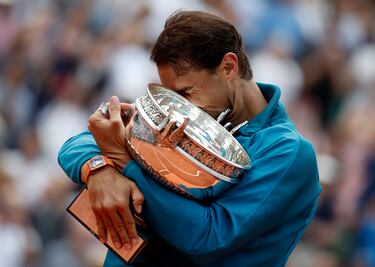
What moments stand out to you?
It’s always easier and more natural to remember the most recent ones because they’re fresher in your mind. But for me, there have been moments that were particularly meaningful. Roland Garros 2006, for instance. That was the first year after my foot injury. It’s not about making it sound dramatic, but we honestly didn’t think I’d ever play tennis competitively again. I remember that because we went through some tough times. Later injuries in your career, after you’ve achieved a lot, are a bit easier to handle, or at least viewed through a different lens. But when you’re just starting out, and after your first really good season you’re told you might never play again, it’s hard. It wasn’t a matter of weeks—it was months. From Madrid, which was indoors, until January, I couldn’t find a solution. Then, there were other key moments in my career: Wimbledon 2008, the Olympics that year, which were really special too; all of 2013, after being out from Wimbledon 2012 until Viña del Mar with knee pain, was emotional… And Australia 2022 is one of the most thrilling experiences I’ve had.
In any conversation about you, injuries inevitably come up. How did you maintain the resilience to keep coming back?
First, I think it’s because I had the right people around me when I was young, which helped a lot. It’s about how you’re raised and how you learn to face these challenges. Everyone has their own personality, but the examples you have growing up shape how you approach things. And then, I’ve been lucky enough to love what I do. I’ve always lived it with passion and a sense of responsibility. It’s not just about enjoying it, but feeling a personal duty to do everything I can until I can’t anymore. That’s how I view sports and life in general. And that’s always been my mindset. The main reason I’ve been able to keep going is a deep sense of responsibility to do things as best as I possibly could.
“I don’t believe in fairy tale endings, almost no one gets them.”
Rafa Nadal
You’re going to retire in Málaga at the Davis Cup. What are your expectations?
For a while now, I haven’t expected much from my final matches because you start to understand how difficult everything becomes. I don’t believe in fairy tale endings. Almost no one gets them, because in sports, it’s hard to finish on top unless you’re completely healthy and can win but just don’t enjoy it anymore. Then you can retire while still winning. But when you’re passionate about what you do, it’s tough to retire at 100% and still winning. I just hope to be healthy and prepared enough to enjoy the moment and help the team. Back in 2004, the Davis Cup gave me my first big thrill as a professional tennis player. Finishing again in a Davis Cup final is a good way to close things out. Hopefully, it will end positively, whether I play or not.
You mentioned that your son hasn’t seen you win, but it’s been nice having him at the matches, right?
Yes, of course. It’s been really nice. People asked me, “Why didn’t you retire sooner?” From the outside, it’s easy to give opinions, sitting on a sofa, writing from a phone or a computer. But when you’re happy doing what you do, and your family is happy too, you want to keep going. My family was enjoying traveling with me to the tournaments and experiencing a different way of life. I would have liked to continue if I could have found a way to do it that made me happy. And that’s because I had the support of the people I needed by my side—they were happy following me. If they hadn’t been, it would’ve been much harder to keep going, especially given how things have been lately. Having spent this past year and a bit traveling with my family in a different way and experiencing the tour differently has been a positive and unforgettable experience for me.
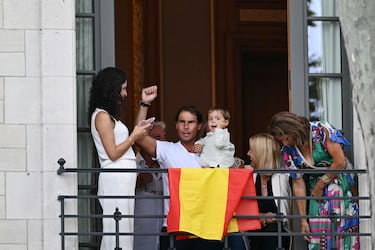
These past few days, you’ve been with Djokovic, the last of the Big Three, and also with the players who will dominate tennis going forward. How do you see Djokovic’s future, and what do you predict for Alcaraz and Sinner?
As for Djokovic, I’m not sure. It’s human nature that, even if Novak stays healthy, he’s getting older, and at some point, the clock catches up with everyone. With Federer retired, and me about to retire, his two biggest rivals are no longer around. At some point, I think Novak will also experience a dip in motivation and step aside. It happens to everyone. Novak is good enough that if he stays healthy, he can still compete at the highest level and aim for the biggest titles. If he keeps enjoying it, he’ll keep going. But if at some point the effort it takes to stay at that level isn’t worth it to him anymore, I think he’ll step aside. That’s my take. As for Alcaraz and Sinner, they’re set up for long, successful careers. They’re both a step ahead of everyone else. On any given day, a lot of players can beat them, but over the long term, there’s no one else who can consistently challenge them unless they suffer an injury that prevents them from playing at their best.
The golden era—your era—is ending. While tennis will go on, do you think fans will be as captivated by the next generation?
Things are cyclical, and it’s natural that when an era ends, one in which three players have achieved more than anyone else in tennis history, a special chapter closes. But we’re talking about a new era now, with players like Carlos, who already has four Grand Slams, and Jannik, who has two. There will always be champions each year, and if they can stay at this level, they’ll generate huge interest. Over time, that interest will grow for obvious reasons. Big stars don’t emerge overnight. What makes them special is their longevity, that moment when they transcend the sport, and people go to see them not just because they love tennis, but because they want to see the player. It’ll take some time, but I’m convinced it will happen.
“Alcaraz and Sinner are ahead of the rest; I don’t see any rival who can consistently challenge them.”
Rafa Nadal
Related stories
Who was your toughest rival?
I’ve played Djokovic more than anyone else, but for me, my biggest rival was Federer. When I came onto the circuit, Federer was already there, and he was the first. In the prime years of my career, it was Roger and Novak. But in those early years, which are so impactful, it was always Roger. I think, and I don’t know why, that my rivalries with both of them were more intense than the one they had with each other. I’m not sure why, but I feel like the world sees it that way too. Maybe with Roger, it was because our styles and approaches to the sport were so contrasting. And with Novak, it was an incredible challenge. He’s a player who has managed to maintain a very high level and improve every year. The numbers show he’s the best, which means his tennis has also been the best. And he’s been the most injury-free, which allowed him to maintain his physical, mental, and tennis levels longer than anyone. That’s why he’s the best, and he’s earned it.“

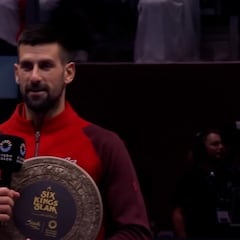
Complete your personal details to comment